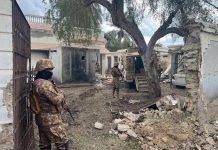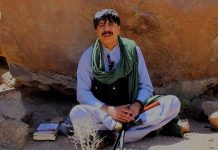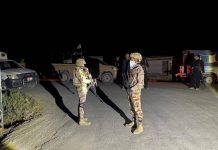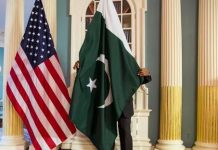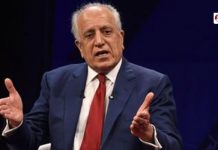To mark the 12th year of the disappearance of Dr. Deen Muhammad Baloch, protest rallies and demonstrations were carried out on July 28th in Karachi and several other countries around the world, including the United Kingdom, Netherlands, South Korea, Germany, United States and Greece. Activists and sympathizers gathered en masse, carrying placards and banners and demanding an end to “enforced disappearances.”
According to the details, a large demonstration was called in Karachi by Sammi and Mehlab Deen Baloch, daughters of missing Dr. Deen Muhammad Baloch who was “forcibly disappeared” in June 2009 from the Ornach area of Khuzdar. Twelve years later, he remains a missing person. His family members have knocked on every door in search of justice but to no avail. Despite all their efforts, the relevant authorities have turned a deaf ear to their pleas. Now they are thinking of going beyond the norms and doing something that may end up being a stigma on the face of the state for the decades and centuries to come.
Addressing the gathering in front of Karachi Press Club, Sammi Deen Baloch said that “enforced disappearances” are no longer restricted to Balochistan, but have spread throughout Pakistan. She said that the list of missing persons is growing every day with no end in sight. She acknowledged that the current government has introduced legislation in the constitution to criminalize the practice, but it has failed to take any practical measure to end “enforced disappearances.”
She said that my father was “abducted” in the Ornach area of district Khuzdar by members of Pakistan’s intelligence agencies who were dressed in plain clothes. She said that my father was on duty when he was “forcibly disappeared.” Twelve years have gone by, and my father is still a missing person, she said.
Sammi Baloch said that we have knocked on every door in pursuit of justice, but to no avail. We repeatedly visited the commission for enforced disappearances, the Supreme Court of Pakistan and similar other judicial bodies, but every time we got false assurances and promises. She said that we even visited Prime Minister Imran Khan’s office early in 2021 where he showed serious interest in resolving the issue and promised that the he will contact and inform us about the proceedings of the case. Months later, we haven’t received the promised call from the premier, she said.
Sammi Baloch said that we have utilized every source at our disposal, but we have only seen disappointment and hopelessness. She said that if the authorities continued to neglect her remonstrations, she will have to resort to the only final option left at her disposal: self-immolation.
Dr. Deen Mohammad’s spouse, veteran social leader Yousaf Masti Khan and family members of Baloch missing persons also addressed the demonstration, saying that the legislation against enforced disappearances must be put into practice.
Monday’s demonstrations were not just limited to Karachi – activists gathered around the globe to mark the 12th year of Dr. Deen Muhammad’s disappearance. The Baloch National Movement said in a recent media statement that its workers had carried out massive demonstrations in countries like the United States, UK and Netherlands.
The BNM said that a demonstration was carried out in Netherland’s capital Amsterdam where Baloch activists and social workers marched on the roads, chanting slogans against the rampant human rights abuses in Balochistan. They said that the Pakistani state is targeting Baloch student leaders, social and political workers, human rights activists and people from different walks of life. Thousands of innocent Baloch missing persons are suffering in torture cells, they said.
A similar demonstration was also conducted in Bielefeld, Germany, where the Baloch diaspora gathered to express support for the victims of enforced disappearances “state-sponsored” violence in Balochistan. The speakers said that the families of Baloch missing persons marched over 3000 kilometres from Quetta to Islamabad in quest of justice. They filed petitions and even knocked on the doors of the country’s highest judicial body, the Supreme Court, but they were turned away every time, the speakers said. They said that Pakistan was once a colony of the British; now it is a “terrorist hub.” None of its neighbours, from Afghanistan to India, are safe from its activities. “Pakistan has become a danger for the world peace”, they said.
In the United States, Baloch and Pashtun activists gathered in front of the White House, brandishing placards and banners and raising slogans against the “barbarities” of the Pakistani state. The speakers said that Balochistan is going through one of the worst humanitarian crises in history. They stressed that the Baloch nation now confronts the threat of genocide at the hands of the Pakistani state.
Similarly, Baloch activists carried out demonstrations in Athens, Greece, and Busan, South Korea, to mark the 12th anniversary of the disappearance of Dr. Deen Muhammad Baloch and express solidarity with his family members. The protestors distributed pamphlets to spread awareness about the human rights abuses gripping Balochistan. They demanded that the European Union, the United States and the United Nations take notice and hold Pakistan accountable for its “war crimes” in Balochistan.











